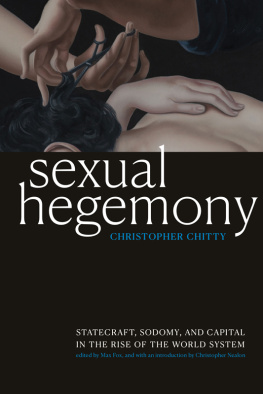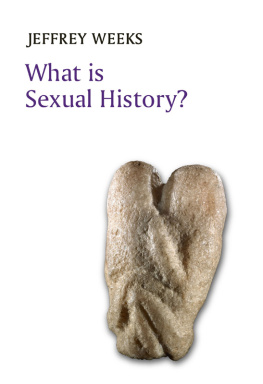THEORY Q A series edited by Lauren Berlant and Lee Edelman
sexual hegemony
CHRISTOPHER CHITTY
STATECRAFT, SODOMY, AND CAPITAL
IN THE RISE OF THE WORLD SYSTEM
edited by Max Fox, and with an introduction by Christopher Nealon
Duke University Press Durham and London 2020
2020 DUKE UNIVERSITY PRESS
All rights reserved
Printed in the United States of America on acid-free paper
Designed by Courtney Leigh Richardson
Typeset in Minion Pro by Copperline Book Services
Library of Congress Cataloging-in-Publication Data
Names: Chitty, Christopher, [date], author.
Title: Sexual hegemony : statecraft, sodomy, and capital in the rise of the world system / Christopher Chitty.
Other titles: Theory Q.
Description: Durham : Duke University Press, 2020. | Series: Theory Q | Includes an index.
Identifiers: LCCN 2019054735 (print)
LCCN 2019054736 (ebook)
ISBN 9781478008675 (hardcover)
ISBN 9781478009580 (paperback)
ISBN 9781478012238 (ebook)
Subjects: LCSH : Queer theory. | HomosexualityPolitical aspects. | CapitalismSocial aspects. | Philosophy, Marxist. | Marxian economics. | Socialist feminism.
Classification: LCC HX H C 45 2020 (print)
LCC HX H 65 (ebook)
DDC 306.76/609dc23
LC record available at https://lccn.loc.gov/2019054735
LC ebook record available at https://lccn.loc.gov/2019054736
COVER ART : Jesse Mockrin, Some Unknown Power (2018). Image courtesy of the artist and Night Gallery. Photo by Marten Elder.
contents
The following text represents both a precious record and a bitter loss. Though a thrilling and innovative piece of scholarship, it is incomplete and full of the impossible promises of further writing. Compiled and edited from drafts retrieved after their authors early death, the text attempts to present the theoretical innovations that Christopher Chitty had been laboring with over the course of his academic career, in the hope that his insights might be shared and spur others to take up the fruits of his discoveries.
After he died in the spring of 2015, I was granted access to what his family and friends were able to gather from his digital files: early drafts of chapters, essays submitted as coursework, notes for further refinement or research, research he had conducted but not incorporated into a textthat sort of thing. I asked friends and comrades if they had any copies of papers I didnt know about, and I transcribed MP 3s of conference presentations that, mercifully, archivists had secured online. Painfully, I mined my own inbox for the drafts of essays on which we had attempted to collaborate but that had gone nowhere (one, I am now astounded to recall, was a review of a recently published book by Foucault titled Speech Begins after Death ), hoping not to have to look too long at the last email I sent him, an invitation to a friends film screening, which is where I was when I got the news.
Christopher Chitty was a brilliant young scholar and activist, endowed with a rare eye and mind and deeply beloved by a genuinely wide community. He was nearing completion on his PhD in the History of Consciousness program at University of California, Santa Cruz, when he killed himself. His dissertation, posthumously recognized under the title Sexual Hegemony, Early Modern Republics, and the Culture of Sodomy, was a far-ranging attempt to think through the failure of sexual liberation by returning the history of sexuality to a history of property, as he put it, splicing world-systems theorys account of the transition to capitalism from feudalism with advances in the study of sexuality made since the heyday of Foucault.
Chitty was convinced that the historical emergence of cultures of male same-sex eroticism as a problem within bourgeois polities belied a key aspect of such formations new form of rule: sexual hegemony. Sexual hegemony, in his words, exists wherever sexual norms benefiting a dominant social group shape the sexual conduct and self-understandings of other groups, whether or not they also stand to benefit from such norms and whether or not they can achieve them. These groups were not communities defined by sexual identity, a category whose history he endeavored to illuminate, but classes. While he deployed this concept to analyze a number of premodern social forms, most crucially, the concept of sexual hegemony allowed him to historicize sexuality as such. For him, sexuality could only become a problem for societies in which communities of producers have been separated from their means of production because such a separation decouples biological reproduction from the reproduction of ownership of such means.
Broadly following Giovanni Arrighis schematic in The Long Twentieth Century , Chitty looked for evidence of the link between sexual hegemony and social form in crackdowns on public cultures of male sodomy in Arrighis four hegemonic centers: Florence, Amsterdam, London, and New York, adding Paris for its role in the development of the bourgeois state. He found that periods of financialization (which in Arrighis understanding signal the decline of one hegemonic center and the rise of the next) tracked with periods of increased policing of homosexuality. This allowed him to argue that homophobia is not a timeless or religious prejudice that stands by waiting for any arbitrary moment in which to flare up; instead, the problem of male homosexuality represents the form taken by a particular political contradiction or antinomy in bourgeois society, one which economic crises can inflame but not defuse without contingent political antagonism. His stance can be summed up in the following passage:
In short, human sexuality is not only malleable and historical; indeed, at certain points in history, such transformations of human nature were central to the forces of production and certain objectives of statecraft. The problem of sexual hegemony is both a question of establishing whether same-sex attraction, solidarity, and erotic attachments, as such, presented an antagonism to particular relations of force that required neutralization and a question of what relations of force in a particular conjuncture enabled its repression or allowed it to exist unperturbed. These considerations have less to do with a phobia or panic, without regard to political and institutional context, than with an uneven process of development in which dominant groups, who viewed sexual regulation and repression as in their interests, intervened in these relations of force to effect such transformations.
This was the insight with which he wrestled over the course of his writing. It is clear, however, that at the time of his death Chitty was still ambivalent about the form his argument should ultimately take. He drafted and redrafted the chapter on northern Italy, sometimes centering his theoretical apparatus, sometimes staging scenes that performed more of the argumentative work, sometimes pausing to conduct an analysis of a Florentine painting or novel. The later chapters, too, expanded and contracted in scope over various revisions, sometimes dilating on the immediate antecedents of postwar gay identity in the period of American hegemonythe coordinates of which described the limits of the gay liberation movement that occupied much of his thinkingand sometimes diving into later historiographical debates. I found chapter outlines that posited whole new sections or concerns that were evidently never written or which, perhaps, I simply couldnt dig up. A friend told me recently that the last thing Chris told her about the project was that hed written a new introduction and was reconceptualizing the whole project as something sleek, which, god bless them, the manuscripts he left us decidedly were not.
In assembling the following text, however, I did try to condense the exposition of his thought. Given that it was written as his PhD dissertation and not a book for wider publication, there were plenty of passages intended mainly to demonstrate his fluency with the literature. He had it. Attentive to the long tradition of political philosophy from which his innovations emerged, Chitty was an unsurpassed reader of Foucault as a close reader of Marx, the latter of whom he, too, could boast of a rare understanding. In a paper delivered at a conference in 2013, framed by an exploration of Foucaults sins vis--vis the intellectual formation of queer theory that sprung up after him, Chitty wryly observes the following about his two signal thinkers, which could equally well describe his own approach:
Next page








